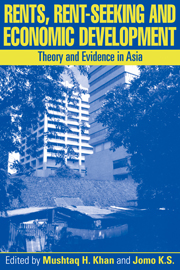Book contents
- Frontmatter
- Contents
- List of Figures
- List of Tables
- List of Contributors
- Acknowledgements
- List of Abbreviations
- Introduction
- 1 Rents, Efficiency and Growth
- 2 Rent-seeking as Process
- 3 Rent-seeking and Economic Development in Thailand
- 4 Thailand's Old Bureaucratic Polity and Its New Semi-democracy
- 5 Obstructive Corruption: The Politics of Privilege in the Philippines
- 6 Funny Money: Fiscal Policy, Rent-seeking and Economic Performance in Indonesia
- 7 The Malaysian Development Dilemma
- 8 Financial Sector Rents in Malaysia
- Index
6 - Funny Money: Fiscal Policy, Rent-seeking and Economic Performance in Indonesia
Published online by Cambridge University Press: 05 March 2012
- Frontmatter
- Contents
- List of Figures
- List of Tables
- List of Contributors
- Acknowledgements
- List of Abbreviations
- Introduction
- 1 Rents, Efficiency and Growth
- 2 Rent-seeking as Process
- 3 Rent-seeking and Economic Development in Thailand
- 4 Thailand's Old Bureaucratic Polity and Its New Semi-democracy
- 5 Obstructive Corruption: The Politics of Privilege in the Philippines
- 6 Funny Money: Fiscal Policy, Rent-seeking and Economic Performance in Indonesia
- 7 The Malaysian Development Dilemma
- 8 Financial Sector Rents in Malaysia
- Index
Summary
As Asia's economic crisis continues to unfold, commentators have been scrambling to review earlier ideas about the political economy of the region's rapid economic rise. One theme which has been widely touted in this context is that rent-seeking and corruption lie at the heart of the current problems. Although having considerable popular and intuitive appeal, this line of argument faces an immediate problem: if rent-seeking and corruption are so economically destructive, how is it that the region did so well for so long? This is a knotty theoretical problem, with important policy implications.
I will explore this problem by focussing on Indonesia and a set of ideas about the political and institutional underpinnings of rent-seeking. My aim is to develop an argument that will help to explain why Indonesia (and perhaps some other countries) succeeded in achieving sustained rapid economic growth in the midst of what was widely regarded as a sea of rent-seeking activity. Inevitably, my focus will be on the Soeharto era – the roughly three decades of rapid growth that came to an abrupt halt with the current region-wide economic crisis.
Long before the onset of the Asian economic crisis, a large academic literature on the political economy of industrial success in Asia focussed on the so-called strong states of South Korea, Taiwan, Hong Kong, Singapore and, earlier, Japan. One of the most well-known propositions from this literature was that relatively strong and capable states were insulated from the diversionary political pressures of rent-seekers, and were thus able to push rapidly ahead with policy measures which underpinned high-speed export-led industrial growth.
- Type
- Chapter
- Information
- Rents, Rent-Seeking and Economic DevelopmentTheory and Evidence in Asia, pp. 248 - 273Publisher: Cambridge University PressPrint publication year: 2000
- 16
- Cited by



